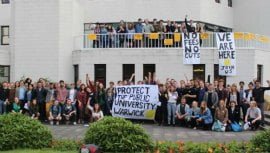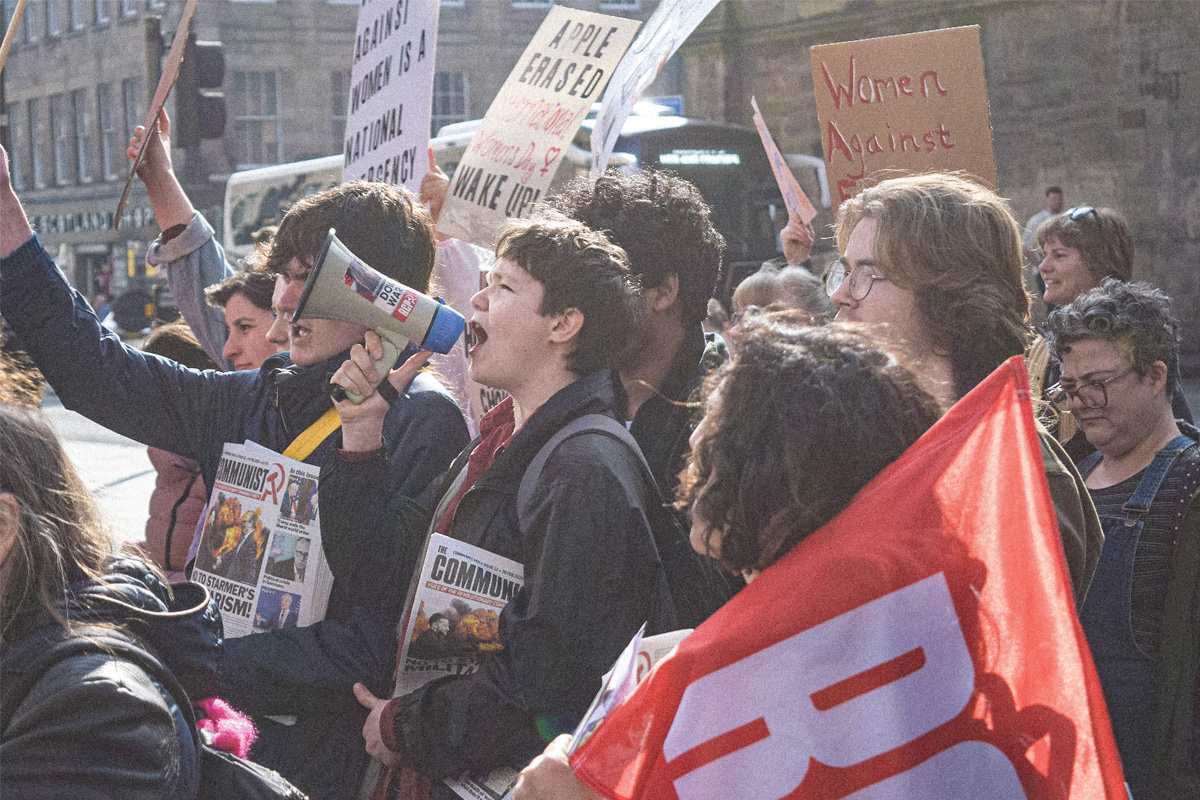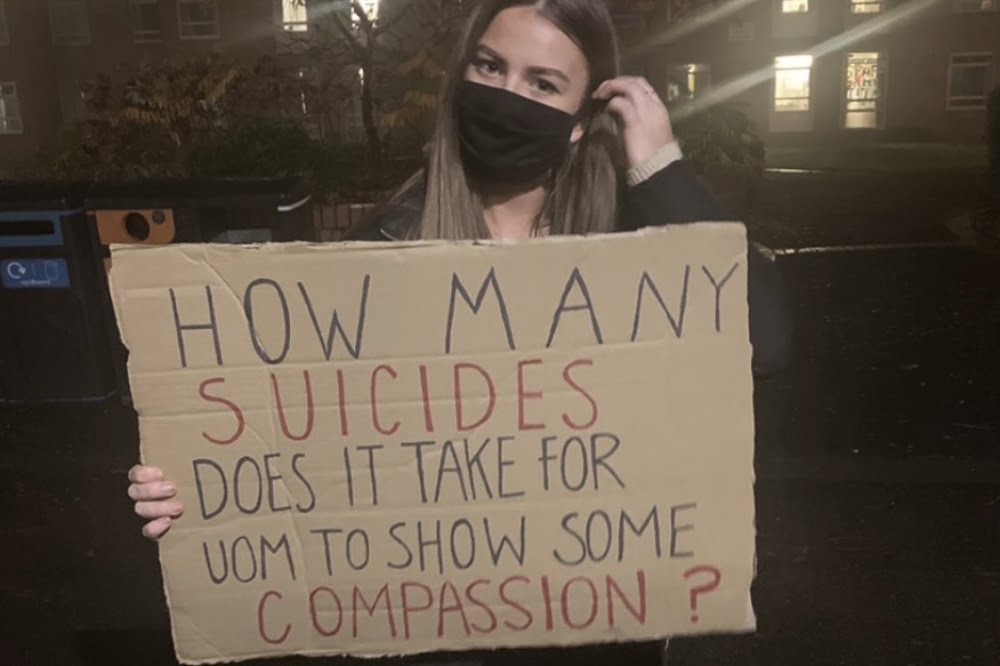On Saturday 22nd June, the student occupation at Warwick University came to a disciplined end when the students involved left the building as a cohesive and united group. The sit-in may now be over, but the students have started a process of discussions that will continue, raising fundamental questions about the nature of education in capitalist society at a time when the crisis is resulting in cuts to education spending and increasing costs for students.
Just after 4pm on the Saturday afternoon of June 22nd the student occupation of the Senate House at Warwick University came to a disciplined end when the students involved left the building as a cohesive and united group. The student paper on campus, The Boar, reported the end of the occupation:
A spokesperson for the group told the Boar: “We thought it was important that this didn’t drag out to the end of term and the University didn’t resort to the disproportionate use of legal methods or disciplinary action to threaten us to go out.
“We had a week of activities to open this as a space for dialogue. In this short space of time we have accomplished a great deal towards that end. This is very much the beginning and occupation of the Council Chamber was just one method of ours and there’s a larger group who is willing to engage in further direct action within the academic year.
“We feel that whilst this occupation has finished we do remain constantly present at the University. The yellow squares are not going to disappear.
“We are committed to continuing this fight against this government. Throughout this week our activities both inside and outside are seeing the emergence of a coalition of students and staff engage in the same fight.”
Under the banner of Protect the Public University Warwick (PPUW) the students had been occupying the Senate building since Friday June 14th. The PPUW action group, comprising those involved in the sit-in and a larger support group outside the building, had issued a report outlining their grievances:
1. Income inequalities
In the year ending July 31st 2012 the Vice-Chancellor, Professor Nigel Thrift, saw his pay increase by £42,000 or 15.33% taking it up from £274,000 to £316,000. At the same time the lowest paid staff member on site earned just over £14,000. The VC’s rise was therefore three times the annual wage of the lowest paid and the wage differential is now 22:1.
2. Salary increases for those at the top
In 2007 some 46 people were paid more than £100,000. By 2012 this had increased to 110. Over five years this is an increase of 139% in numbers. The Warwick Remuneration Committee that decides these matters has 4 members: 2 are currently active in the private sector and I of them is the VC Nigel Thrift.
3. Staffing levels
In 2009 some 4,523 people worked at the university. By 2012 it was 4,351. Between 2010 and 2012 academic staffing fell by 128.
4. Financial Surpluses
In 2009, Warwick University’s financial surplus was £2.7m. By 2012 it was £31m. At the same time spending on teaching and research as a percentage of income had gone down from 55.4% in 2009 to 51.7% in 2012.
There are also further grievances concerning access for poorer students, increasing accommodation costs, plans to increase tuition fees and the privatisation of student debt. In short, Warwick University is more and more becoming an institution to generate profits, where “commodification and marketisation” is replacing the function of education.
The University is governed by the Council. 30 people have access to Council meetings – 27 members and 3 attendees. 13 have corporate backgrounds, 11 are academics, 5 are public figures and 2 are students.
Two days before the ending of the sit-in two PPUW spokespeople came to the monthly meeting of the Coventry TUC to explain their case. They received the support of the CTUC. On the day before the end, a day that was the first of two Open Days at the University, the supporters outside the Senate building set up a camp and held a “teach-in” of talks by staff, students and outside supporters. The Boar, the student newspaper, reported the teach-in as follows:
The protesters at the camp held a series of talks in the afternoon, which were attended by around 80 people.
Professor Thomas Doucherty, who serves on the Steering Committee for the Council for the Defence of British Universities, condemned privatisation as “fundamentally a logic of theft”.
“Everyone knows that the neoliberal principles we are being asked to subscribe to are lies,” he said. “The worrying thing is that debt is becoming normalised.”
“Stay strong,” he told the protesters. “You are on the right side of history. We will win.”
Christopher Maughan, a PhD English student, emphasised the importance of campus activism.
“I’ve learned so much more from attending things outside the lectures than I have in a classroom,” he said.
“Can we recuperate the human and find the university that is cynically advertised in the prospectuses but is actually happening here [at the camp]?” he asked the audience.
Darrall Cozens, chairman of the West Midlands branch of the retired members of the University and College Union, encouraged students to get their ideas out into the wider community. He also criticised the handling of the 2008 banking crisis.
“What started out as a private debt of the banks became a public debt of you and me,” he said.
By their actions the PPUW students have started a process of discussions that will continue in the new term in September. They have raised fundamental questions about the nature of education in capitalist society, especially at a time of capitalist crisis that is resulting in cuts to education spending and increasing costs for students.
The next stage will be to deepen that discussion so that the focus becomes one of understanding the causes of the crisis so that policies can be developed that will banish capitalist crises to the dustbin of history. In this manner the wealth that is created by the labour of the working class can be used to provide free education, as that wealth will be owned and controlled by those who produce it. Then we will have universities that will provide an education to raise students’ horizons; to develop to the full their potential and to acquire skills that can be used for the benefit of those involved and for the whole of humanity. That means fighting for a new kind of society, a socialist one.
For now the sit-in is over, but support for the PPUW students can still be sent to warwickagainstprivatization@gmail.com






